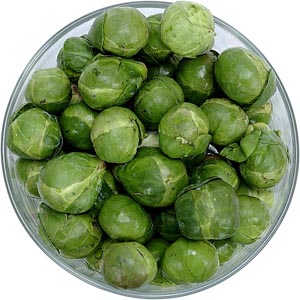![[Metroactive Dining]](/dining/gifs/dining468.gif)
[ Dining Index | Santa Cruz Week | SantaCruz Home | Archives ]
The Resistance Diet, Part II
Stocking up on integrity and seasonal vegetables this winter
By Stett Holbrook
To follow up on my anti-Bush screed from a couple of weeks ago about embarking on a "resistance diet" and choosing what you eat wisely, the Organic Trade Association has released some interesting data about the growth of the organic market. The industry grew by a whopping 20 percent in 2003 to reach $10.8 billion. That's starting to sound like real money.
True, many organic companies are owned by large, less-than-righteous corporations and some argue organic standards are being watered down by the entry of agribusiness, but it's hard to dispute the benefits of an industry that uses no pesticides, herbicides and other nasty stuff that's better left off your food.
To make shopping for organic and sustainably produced products easier, the Global Resource Action Center For the Environment (GRACE), a New York-based environmental advocacy group, has relaunched its excellent Eat Well Guide at eatwellguide.org. The concept behind the website is to link consumers looking to buy meat, poultry, dairy and eggs with local farmers and markets.
"Often, families who want to eat sustainably feel locked into buying mass-produced meat from factory farms because they don't know where to find healthier alternatives," says GRACE president Alice Slater. "As families prepare for the upcoming holiday season, the Eat Well Guide provides an easy way for them to exercise more choice in what they feed their families for the holidays."
To use the site, you simply enter your ZIP code and up pop several producers in your area. Another great, map-based site for locating sustainably produced products is Localharvest.Org.
Cold Weather Veggies
The summer produce season is over, but that doesn't mean you need to turn to canned vegetables or out of season produce from Chile. Winter vegetables abound and they complement the slow-cooked, heartier foods that are so satisfying when it's cold outside.
Copyright © Metro Publishing Inc. Maintained by Boulevards New Media.
For more information about Santa Cruz, visit santacruz.com.
![]()

Suffer the Little Cabbages Unto Me: Many people who hate Brussels sprouts don't realize they've been eating them overcooked their whole lives. Others don't care.
BRUSSELS SPROUTS: These golf-ball-sized members of the cabbage family have suffered more abuse than civil rights under John Ashcroft. Treated properly, they're delicious and high in Vitamin C. The main crime against them is overcooking, which makes them bitter. The best method is to blanch them and then sauté in butter or olive oil. Sautéing with chopped bacon and Dijon mustard is especially good.
BUTTERNUT SQUASH: The great thing about this peanut-shaped squash is that it's so easy to prepare. Split in half, clean out the seeds, dab with a little butter, cinnamon and nutmeg, and bake at 375 degrees for about 40 minutes. Eat and enjoy.
BEETS: Unlike the purple slabs that come in cans, fresh beets come in a variety of colors like gold, pink, candy-striped and red. Chiogga beets are some of the best. Steamed and served hot with just salt and pepper or cold in vinaigrette, beets are one of winter's star vegetables.
BROCCOLI RAAB: Also called rapini, broccoli raab has vaulted from its status as Italian peasant fare to a trendy vegetable. Sautéed with garlic and olive oil it's a great side dish, or couple with Italian sausage for a great pasta dish.
PARSNIPS: Parsnips are carrots' more interesting cousin. Their subtly, spicy-sweet flavor makes them a great winter vegetable. Roast to a golden brown or steam and purée and add to mashed potatoes.
From the December 8-15, 2004 issue of Metro Santa Cruz.